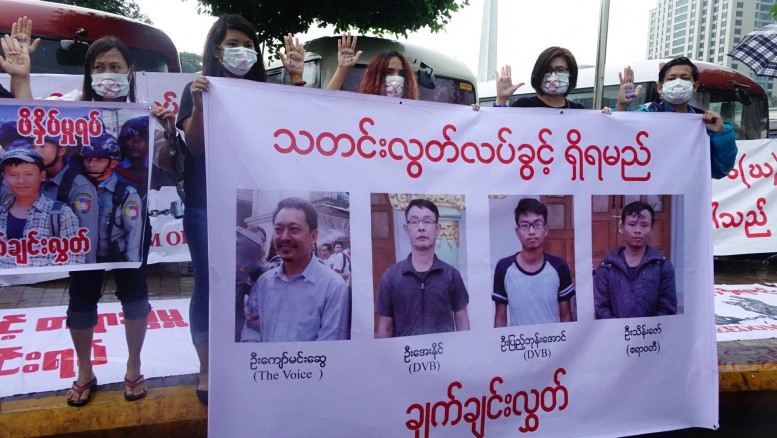Around 50 Burmese journalists staged a protest in front of Maha Bandoola Park in central Rangoon today, calling for the immediate release of Lawi Weng, a reporter for The Irrawaddy, and Aye Nai and Pyae Phone Aung from DVB.
The trio were arrested and charged with Unlawful Association earlier this week after covering a drug-burning ceremony in Palaung [Ta’ang] territory.
The protesting journalists also launched a signature campaign, calling for the repeal of Article 66(d) of the Telecommunications Law, which critics say is misused by the government and military as a tool to stifle criticism and dissent.
This afternoon’s rally and petition were organised by the Protection for Journalists Committee.
“The authorities are threatening journalists, and so we must seek a solution,” said committee member Thuzar.
Matthew Smith of Fortify Rights told DVB that Article 66(d) puts journalists and others at risk of criminal defamation simply for doing their jobs or exercising their right to the freedom of expression.
“If Myanmar fails to repeal this provision, people will continue to face wrongful convictions and tensions will rise. People in the government who made their names fighting oppression are quickly sliding down the slope of justice. The people of Myanmar have an opportunity now to demand their elected officials do everything they can to end these absurd prosecutions,” he said.
He added that stifling free expression is inherently problematic, and that cases of defamation should never be criminalised.
The Telecommunications Law, or Article 66(d), has been used to jail or silence journalists investigating reports several times in recent years.
In one instance, Rangoon’s Chief Minister Phyo Min Thein filed a lawsuit against the chief executive officer and chief editor of Eleven Media Group regarding their investigation of a local real estate deal.
[related]
Earlier this month, the chief editor of The Voice Daily, Kyaw Min Swe, was charged under Article 66(d) and then denied bail for failing to provide the requested medical documents.
Article 66(d) of the Telecommunications Law states that anyone “extorting, coercing, restraining wrongfully, defaming, disturbing, causing undue influence or threatening to any person by using any telecommunications network [read: Internet]” faces prosecution and a possible prison sentence of up to three years, plus a fine.
Recently, the Commission for the Assessment of Legal Affairs and Special Issues amended the clause to allow bail and reduce sentences to as low as two years for those convicted.
Burma watchers and members of the media have criticised Article 66(d) because it appears to contradict Section 354 of the constitution, which specifically protects freedom of expression and opinion, except in instances where it undermines “law and order, community peace and tranquility, or public order and morality”.



